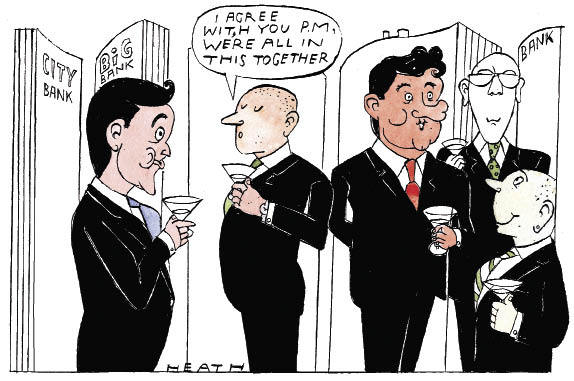Universities in England should be able to charge unlimited fees, according to a report by Lord Browne of Madingley; students would start repaying loans when their earnings reached £21,000.
Home
Universities in England should be able to charge unlimited fees, according to a report by Lord Browne of Madingley; students would start repaying loans when their earnings reached £21,000. Vince Cable, the Business Secretary, said the coalition was considering a maximum fee of £7,000. Sir Philip Green, asked to investigate Whitehall efficiency by David Cameron, the Prime Minister, found that paper was being bought too dearly. The rate of inflation measured by the Consumer Price Index was unchanged at 3.1 per cent; on the Retail Price Index, it fell a smidgin from 4.7 to 4.6 per cent. The Queen named the Queen Elizabeth, Cunard’s 92,000-ton liner, built in Italy.
Alan Johnson was appointed shadow chancellor by Ed Miliband, the new leader of the Labour party; he said he would ‘pick up a primer in economics for beginners’. Yvette Cooper became shadow foreign secretary and her husband, Ed Balls, shadow home secretary. Maria Eagle became shadow transport secretary, and her twin sister, Angela, shadow chief secretary to the Treasury. Andy Burnham got education, John Healey health, Sadiq Khan justice, Douglas Alexander work and pensions, John Denham business, Harriet Harman international development, and Hilary Benn became shadow leader of the House. Peter Hain and Shaun Woodward, though not elected to the shadow cabinet, were reappointed to shadow the Wales and Northern Ireland secretaries. Howard Jacobson, aged 68, won the Man Booker prize for The Finkler Question.
An inquest began into the deaths of 52 people killed by bombs in London on 7 July 2005. It heard that the atrocity had been delayed by a day because one of the bombers had to take his wife to hospital. The two men accused of murdering six British Royal Military Policemen in Iraq in 2003 were cleared by a court in Baghdad. Heathrow saw its busiest month in September, with 7.6 per cent more passengers than last September. Mark Byford, the deputy director-general of the BBC, was made redundant, with an £800,000 pay-off and a £215,000 pension. A Bill was introduced for part-privatisation of the Royal Mail. Tate Modern covered 1,200 square yards with 100 million hand-painted porcelain sunflower seeds made by 1,600 people in China, an idea by the artist Ai Weiwei. Claire Rayner, who made a career commenting on other people’s problems, died, aged 79. Five million people were found to be unable to tie their shoelaces.
Abroad
The world was in suspense as an operation was mounted to bring to the surface, one by one, 33 Chilean miners, trapped 2,000ft underground since 5 August. In Hungary, workers hurried to construct an emergency dam before a further collapse took place at a reservoir of toxic sludge from alumina processing at Kolontar that had already sent red mud spilling over an area of 15 square miles and into rivers. A judge in California ordered a worldwide injunction against the ‘Don’t Ask, Don’t Tell’ rule on homosexuals joining the armed forces. France held its fourth day of strikes in a month against raising the retirement age to 62. The Dutch Antilles ceased to exist, becoming autonomous entities in the kingdom of the Netherlands.
Linda Norgrove, a British aid worker held hostage by extremist Taleban in Afghanistan, died during a rescue attempt by United States forces. At first it was said her captors had set off an explosive vest; but then David Cameron said a US grenade might have killed her. President Omar al-Bashir of Sudan said that unless the control of oil and water were resolved by January there could be civil war. Palestinian officials rejected an offer by Israel to halt the building of settlements if they recognised Israel as a ‘Jewish state’. Morgan Tsvangirai, the Prime Minister of Zimbabwe, wrote to world leaders saying Zimbabwe’s ambassadors did not represent his country.
Kim Jong-un, the presumed heir to the dictatorship of North Korea, was shown in public in the presence of his ailing father, Kim Jong-il. The United Nations elected five temporary members of the Security Council: India, Germany, Portugal, Colombia and South Africa. The US dollar reached a 15-year low against the yen after a meeting of the International Monetary Fund in Washington failed to resolve disagreements on US and Chinese monetary policy. The Nobel Peace Prize went to Liu Xiaobo, sentenced by China to 11 years in jail last December. Dame Joan Sutherland, the opera singer known as La Stupenda, died, aged 83. Gap, the clothes company, dropped a new logo with its name in a different font, after only a week.






Comments